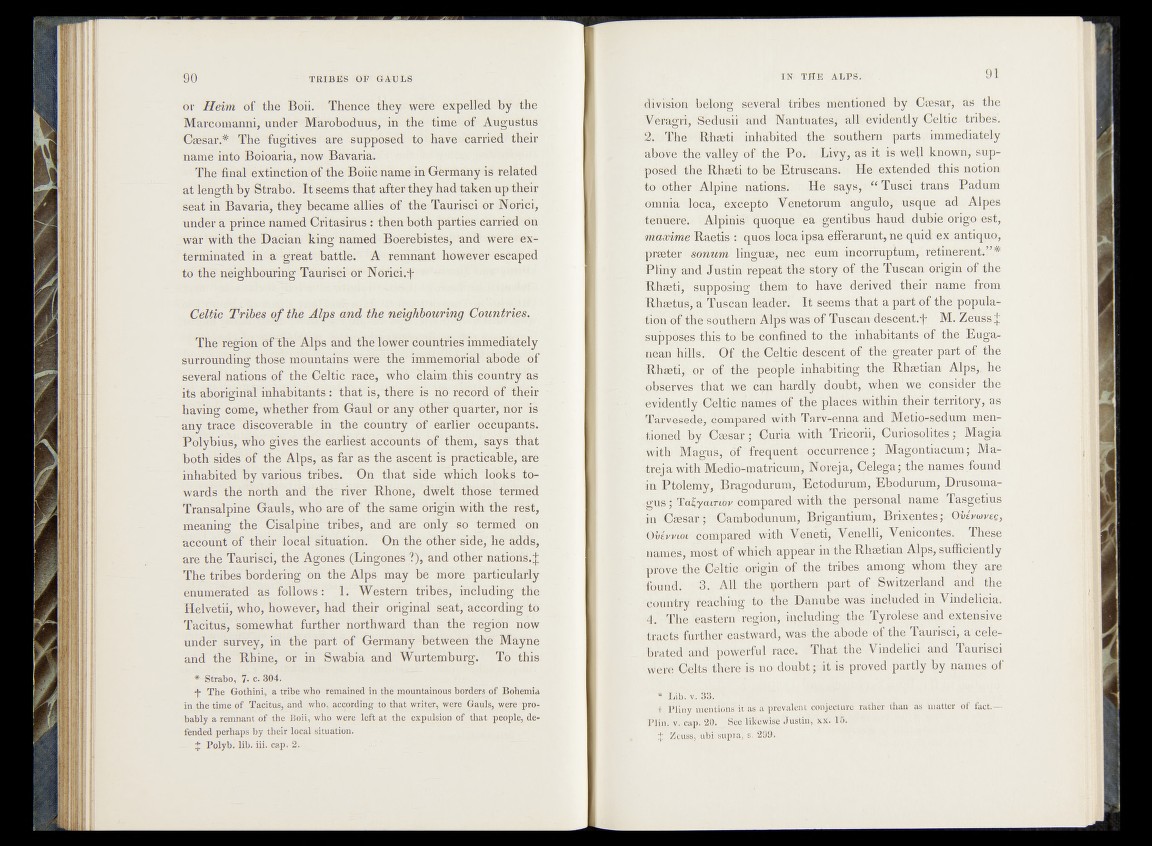
or Heim, of the Boii. Thence they were expelled by the
Marcomanni, under Maroboduus, in the time of Augustus
Caesar .# The fugitives are supposed to have carried their
name into Boioaria, now Bavaria.
The final extinction of the Boiic name in Germany is related
at length by Strabo. It seems that after they had taken up their
seat in Bavaria, they became allies of the Taurisci or Norici,
under a prince named Critasirus: then both parties carried on
war with the Dacian king named Boerebistes, and were exterminated
in a great battle; A remnant however escaped
to the neighbouring Taurisci or Norici.f
Celtic Tribes o f the Alps and the neighbouring Countries.
The region ö fïh e Alps and the lower countries immediately
surrounding those mountains were the immemorial abode of
several nations of the Celtic race, who claim dhis c'ountfy as
its aboriginal inhabitants : that is, there is no record of their
having come, whether from Gaul or any other quarter, nor is;
any trace discoverable in the country of earlier .occupants.
Polybius, who gives the earliest accounts of thpm,* say's'- th a t
both sides of the Alps, as far as the ascent is practicable, are
inhabited by various tribes. On that side which looks towards
the north and the river Ithone, dwelt those termed
Transalpine Gauls, who are of the same origin with tftd '¥ést,
meaning the Cisalpine tribes, and are only so termed 'dn
account of their local situation. On the other side, he adds,
are the Taurisci, the Agones (Lingones ?), and other nations.^;
The tribes bordering on the Alps may bê more particularly
enumerated as follows : 1. Western tribes, including the
llèlvetii, who, however, had their original seat,' according to
Tacitus, somewhat further northward than the region now
under survey, in the part of Germany between the Mayne
and the Rhine, or in“ Swabia and Wurtemburg. To this
*- Strabo, 7* c. 304.
The Gothini, a tribe who remained in the mountainous borders of Bohemia
in the time of Tacitus, and who, according to that writer, were Gauls, were probably
a remnant of the B»ii, who were left at the expulsion of that people, defended
perhaps by their local situation.
— % Polyb. lib. iii. cap. 2.
division belong several tribes mentioned by Cæsar, as the
Veragri; -SeduSii and Nantuates, all' evidently Celtic tribes.
2. The Rhaeti inhabited^ the southern parts, immediately
above the valley of the Poi- ■ Livy, as it is Well known, supposed
the Rhaeti to be Etruscans. He extended this notion
to other Alpine nations: He saÿ.s*,:* “ T.iisei trans Padum
omnia loca, excepfo Venetorhm angulo, usque; ad Alpes
tenùere. Alpiriis’ quoque ea #gneu*tibus haud dubie origd est,
mdooime Raetis : quos loca ipsa efferarunt, ne quid ex antiquo,
preeter • sonum linguae, necoeum ineomiptum, retinerent.” *
Pliny and Justin repeat thafeterçy of the Tuscan, origin of the
Rhætij * supposing them to have .derived' ttoehu naàbe from
Rhætus, a Tuscan le tte r. It seems that ,a part of thetpqpula-
tion bfhlV e'ii thefn; A'lpslwas of Tuscaivdescentî^t M.
ïSappèseS thib|t^‘b'ei,COnfined to the inHabit^ntsMf ; tlper> EugU-
nean h i |p Of ;tfti|fOeltic;descent o f thefÿpàtnr part',of; the
-Rhaeti; _qi ';of the qptople inhabitihg^tMI Rhætiari Alps,. li£
'o p h ite s ''that We c^d hardly doubt, when we~ cpn§j.d”er thiv
evidently jChlti'c* names of the .plaças ,within|*t^eir; tÇçritory^às
Tdfv'èMfl^^l^mpared with Tarv-dnna and 'Met^^èdu|a^ men-
rMOMed By with Tricoriq Chriosoh te& Magia
with df vfreA n t* T gccuhijeuce;; M^ontiacpm ; ,Ma-
-treja.with Medio-matricum, Noreja,|^0lega’; the ri'amSifound^
in Ptdlëin^, BragodurunmEctodurum, Ebodurum/Di^o^à;-
,gûs ; T a l y a i f ê y compared'-with the) personal^name - TÇa|^Eus
insiCaesart; ' Cambodunum, Brigantium, B rix en fe jiw tJfw ^ g
OÙ£Vv£ot#impared‘ with Veneti, V ^ e ili, Venjco%S|| These
names, most of which appear in the Rhætian A lp s ,r |tS ^ n ||y
iilê^ve^he Celtic origin of the tribesj|among whom they are
q?ound. -3. All. the porthern .part of Switzerland ; | ik| the
fSu n try reaching to-the Danubeftj$s included in Vindelicia.
/AC The eastern-region, including the Tyrolese andjeÿtensiv^’
tracts further eastward, was* }tfe . abod p ' of the Tatasci^^a^Mp-
Brated and powerful race. -'That t|^Vindelici;.and Taurisci
HBB Celts there i s f e doubt (pit is proved partly by namèfcof
* Lib. v. 33. *
-f _ piiny mention?it as a’ prévalent Wpjetture rather than as ’hiatter of fact.—
Plin. y. cap. 20. See likewise Justin, xx. 15.
$ Zeuss, ubi supra, s. 299.